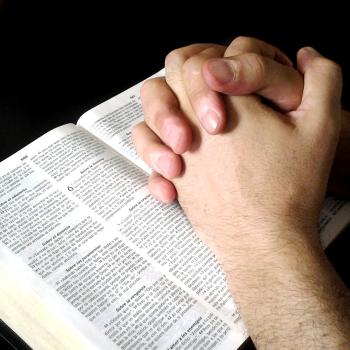When we feel that we have been wronged, it’s a tough sell to ask someone to respond with blessing.
And yet, that is exactly what Jesus teaches us to do.

Image via Pixabay
The teaching comes from the Sermon on the Mount. It is set within a larger passage about foregoing vengeance, and it leads right into Jesus’ famous teaching on enemy-love, which we will come back to.
In that context, Jesus speaks a simple yet powerful and challenging sentence:
“If anyone forces you to go one mile, go with them two miles.” (Mt 5.41)
Anyone in Christ’s audience that day knew exactly what He was talking about.
The Jewish people of the time were under Roman rule. The oppressors’ law said that a Roman soldier had the right to force a Jewish person to carry his equipment for him. But the rule had a limit: the soldier could only force the person to do this for one mile. It would be chaos if soldiers could, at a whim, force people to drop what they were doing and carry the load miles and miles from home, to then have to walk miles back, pick up their work again, etc.
So the Romans had this one-mile right, and in enforcing this right, they essentially made the Jewish person their personal slave, one mile at a time.
It is possible that many in Jesus’ crowd had personally been victim to this demoralizing and degrading action, where the powerful conquering Romans treated the Jewish people like property, lowering them to the place of slaves, and forcing them to serve the hated oppressors.
And Jesus’ response to this demeaning phenomenon?
“Go an extra mile. You know, on top of the one that you are being forced to do.”
As often happens, the words of Jesus just sort of smack us in the face.
These are not light and fluffy Sunday school platitudes. This goes against any natural instinct we have, if we imagine ourselves in the same scenario. “Serve the oppressors even more? Let them get two miles out of us? Reward them for how they are treating us?”
As one congregant once angrily exclaimed to me, “Jesus doesn’t want me to be a doormat!”
And I would agree 100%. A “doormat” is a person who lets people walk all over them because they lack the strength to stand up for themselves. This is not a good quality, and nothing in the teachings of Jesus suggests that this is what He is looking for.
And yet, Jesus willingly chose to empty Himself, to lay down His rights, to put others ahead of Himself, to live a life of other-centered self-sacrificing service, to ultimately give His life for us at the cross (Phil 2.1-11). He willingly put Himself in the hands of sinful men (Lk 24.7) and willingly laid down His life (only to take it up again) (Jn 10.17-18).
He did this, not because He was weak. Jesus was no doormat, letting people walk all over Him because He wasn’t strong enough to stand up. No, Jesus was stronger than can possibly be imagined, and yet willingly chose to do all of these things, because He loved us enough to do them for us.
And now He calls us to do the exact same thing, in love, for others (1Jn 3.16).
Jesus is not asking us to be weak and powerless doormats. It is far more radical than that. What Jesus is asking us to do is to choose to sacrificially serve others, even our enemies, in an “above and beyond” sort of way. And because it is a choice, it comes from a place of strength, not weakness.
And when we do this, we actually stop being doormats.
The Jewish person labouring through the first mile could potentially be called a doormat. They are being threatened, oppressed, into doing something that they don’t want to do. They don’t really have the strength or the ability to say no without facing consequences, and so they are unwillingly going along with it.
But in the second mile, the whole thing gets reframed and redeemed. The second mile isn’t forced, it’s chosen. And you can’t be a doormat if you are choosing to serve someone in love.
In the first mile, we may indeed be a slave. In the second mile, we are freed from slavery completely, because the action is chosen freely. And we are taught in Scripture that we are to use our freedom precisely to “serve one another humbly in love” (Gal 5.13).
And as this column has previously discussed, there is zero credit given by Christ for loving our loved ones – everybody does that. What makes us holy, what marks us as different, what sets us apart as Christ-followers is that, like Him, we are the ones who love not just our loved ones, but even our enemies – Jesus said that this is one of the distinctive things that mark us as children of our Father in Heaven (Mt 5.43-48).
The extra mile strips the oppressor of their power, and liberates the oppressed into freedom by redeeming the whole thing, by taking away its ability to enslave, by turning the entire event into a Christlike act of love and self-sacrifice, done because Jesus asked us to, rather than because we were forced to by another. There can be no doormats or slaves when the act becomes one of love and obedience to Christ. The extra mile sets us free.
It does not always mean that we literally need to do extra, above and beyond what is being asked. When we are feeling powerless, the question really becomes: How can this situation be redeemed in the name of love? How can I turn this situation into freedom through my service? What godly action can I take to reframe this circumstance into something good, done out of my devotion to Christ and my love for others?
There are limits to the principle, to be certain. And, if twisted, it could easily be abused by those in power to demand more service and coerce more submission.
The key element is that the extra mile must be chosen. It cannot be forced, as real love can never be forced.
It also doesn’t mean that, at times, we should not set healthy and reasonable boundaries. If the Romans wanted to enslave your son, you wouldn’t give up your daughter as well in the name of “above and beyond” love and sacrifice. Again, the extra mile is chosen, not forced, and the principle should not be stretched to unreasonable lengths.
The main idea is this: whatever struggle I am walking through, how does Jesus want to me to redeem it through my love and my actions, out of my devotion to Him?
As we do this, we reframe the struggle into something beautiful, we find freedom from oppression, we walk in the ways of Christ as we do so, and we become more like Him when we do.
********
If you’re enjoying what you read, you can follow Third Way Christians on Facebook or Instagram, or sign up to get new columns emailed to you here! As well, you can track along with Chris’ church teaching at Meadow Brook Church’s YouTube page!












